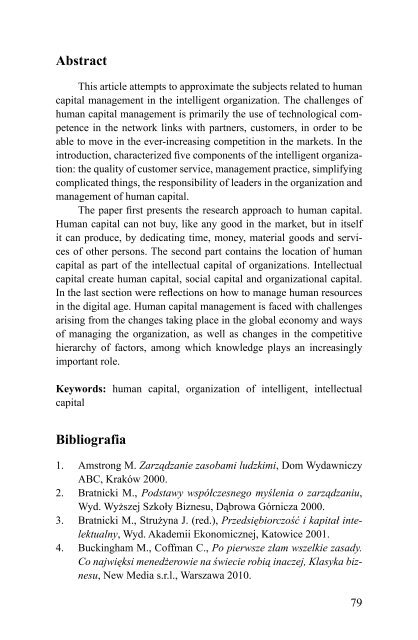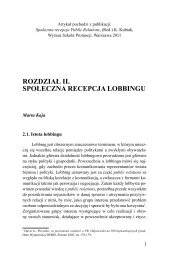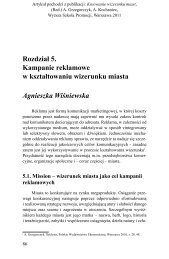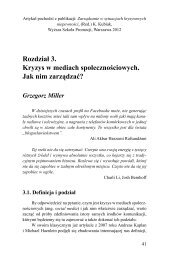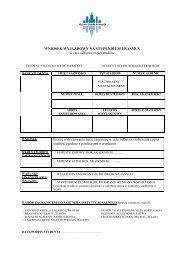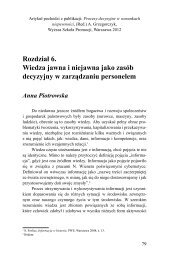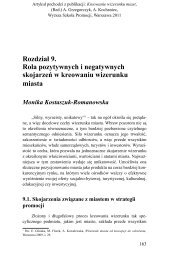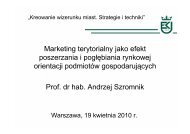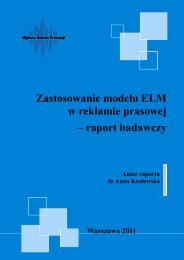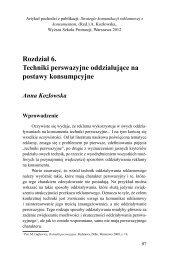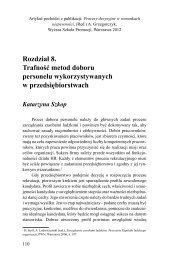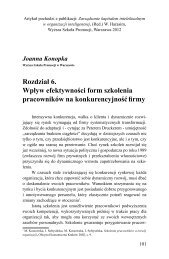RozdziaÅa 4. ZarzÄ dzanie kapitaÅem ludzkim w organizacji
RozdziaÅa 4. ZarzÄ dzanie kapitaÅem ludzkim w organizacji
RozdziaÅa 4. ZarzÄ dzanie kapitaÅem ludzkim w organizacji
You also want an ePaper? Increase the reach of your titles
YUMPU automatically turns print PDFs into web optimized ePapers that Google loves.
Abstract<br />
This article attempts to approximate the subjects related to human<br />
capital management in the intelligent organization. The challenges of<br />
human capital management is primarily the use of technological competence<br />
in the network links with partners, customers, in order to be<br />
able to move in the ever-increasing competition in the markets. In the<br />
introduction, characterized five components of the intelligent organization:<br />
the quality of customer service, management practice, simplifying<br />
complicated things, the responsibility of leaders in the organization and<br />
management of human capital.<br />
The paper first presents the research approach to human capital.<br />
Human capital can not buy, like any good in the market, but in itself<br />
it can produce, by dedicating time, money, material goods and services<br />
of other persons. The second part contains the location of human<br />
capital as part of the intellectual capital of organizations. Intellectual<br />
capital create human capital, social capital and organizational capital.<br />
In the last section were reflections on how to manage human resources<br />
in the digital age. Human capital management is faced with challenges<br />
arising from the changes taking place in the global economy and ways<br />
of managing the organization, as well as changes in the competitive<br />
hierarchy of factors, among which knowledge plays an increasingly<br />
important role.<br />
Keywords: human capital, organization of intelligent, intellectual<br />
capital<br />
Bibliografia<br />
1. Amstrong M. Zarządzanie zasobami <strong>ludzkim</strong>i, Dom Wydawniczy<br />
ABC, Kraków 2000.<br />
2. Bratnicki M., Podstawy współczesnego myślenia o zarządzaniu,<br />
Wyd. Wyższej Szkoły Biznesu, Dąbrowa Górnicza 2000.<br />
3. Bratnicki M., Strużyna J. (red.), Przedsiębiorczość i kapitał intelektualny,<br />
Wyd. Akademii Ekonomicznej, Katowice 2001.<br />
<strong>4.</strong> Buckingham M., Coffman C., Po pierwsze złam wszelkie zasady.<br />
Co najwięksi menedżerowie na świecie robią inaczej, Klasyka biznesu,<br />
New Media s.r.l., Warszawa 2010.<br />
79


